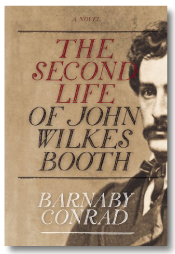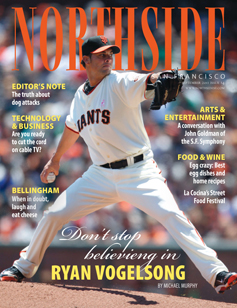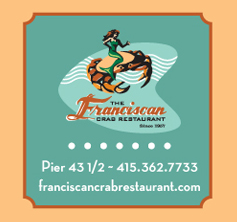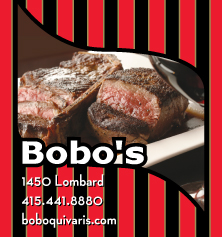
The Second Life of John Wilkes Booth:
By Barnaby Conrad
258 pages, Council Oak Books,
Kanbar/Conrad, $25
By Barnaby Conrad
258 pages, Council Oak Books,
Kanbar/Conrad, $25
Conrad himself is a famous San Francisco character who lived the romantic life of a writer – when one could live the romantic life of a writer. He caroused with Norman Mailer, Truman Capote, Graham Greene, and Gore Vidal. Years later Conrad would collect those stories in a book titled Namedropping.
Conrad is the preeminent expert in the field.
He wrote a novel in 1952 called Matador. There’s an old saying that a writer should write what he knows. Conrad actually became a matador in Spain. It damned near killed him. In his recollection, Time Is All We Have, he gives a hair-raising account of being gored by a bull in the corrida. Matador became a bestseller, winning a National Book Award. John Steinbeck said it “was his favorite book of the year.” Conrad made some money with it and bought a nightclub. The Matador was a legendary spot on Broadway, here in San Francisco. The club drew top music acts and attracted all sorts of Hollywood luminaries. Namedropping wasn’t derided. It was expected.
When Conrad returned from abroad, licking his wounds, he was hired by Sinclair Lewis to be his personal secretary. Are you beginning to sense Conrad’s is a charmed life?
He never forgot Lewis’s idea for the Booth book. His old friend Ray Bradbury, now 89, says it’s Conrad’s “finest book.”
It is a good book, a riveting story that takes off like a shot – sorry about that – from the first pages. Conrad has invented a few characters, the doggedly curious newspaper reporter, Langford Upham, for example. But the historic figures, names that we might recall from reports of what happened that night at Ford’s Theater, are intact. Conrad has an effective device: he uses Booth’s actual words, whether they were uttered or preserved in his diary. The supreme egoist, Booth wanted everything recorded. We have to appreciate how famous Booth was in his day – even before the assassination. He’d be a movie star today.
Booth has always held a special fascination. While Lee Harvey Oswald remains a bit of an enigma, most Americans would be hard-pressed to even name the other two presidential assassins. Charles Guiteau, killer of Garfield, has been reduced in the record to a “disappointed office-seeker.” Leon Czolgosz, simply recalled as “an anarchist,” shot McKinley. It is Booth who captured the imagination of the public. After all, he was a celebrity. Conrad is playing the ultimate “What if?” game that historians love so much. “What if Bobby Kennedy survived?” or “What if Al Gore had won the election, as some say he should have, in 2000?”
What if John Wilkes Booth got away?
Conrad keeps the action moving as quickly as the rapid action of the principal players in the days that followed the Lincoln assassination. We are there in the presidential box at Ford’s and hear what Booth is thinking. Conrad, of course, has cultivated a great knack for detail, even that punch line from the stage where An American Cousin was being performed. “You sockdologizing old mantrap” got such a guaranteed laugh that Booth waited for it. It covered the sound of the derringer firing. Booth can’t help but smugly note to himself that he stole the show. There’s an extraordinary moment when Booth catches a train, only to learn that Lincoln’s funeral train was passing on the other track: “ ... in the middle of the car he glimpsed a great silver catafalque in the center of wood-paneled splendor. An honor guard stood at attention behind it. To Booth’s horror, the lid of the coffin was open – he quickly averted his head, but not before catching a glimpse of that terrible waxen brow, the sunken cheeks and bearded jaw restored by the embalmer’s art.”
One could almost feel sorry for Booth, if anyone can feel sorry for an actor. His own journey will be a tortuous one, but his name, as he hoped, was not forgotten.
The Second Life of John Wilkes Booth is the first book to be published by Kanbar/Conrad, an imprint of Council Oak Books. Conrad’s son, Barnaby Conrad III, who lives in Pacific Heights, edited it.








